#google cloud web hosting
Explore tagged Tumblr posts
Text
Cheap web hosting India plans start at Rs.199 per month and include a free SSL certificate, 99% uptime, 24*7 support, and unlimited storage, Our best cPanel hosting offers easy management and powerful features. Discover cheap web hosting in India with the best cPanel hosting services. Enjoy reliable performance, easy management, and 24/7 support. Perfect for websites of all sizes, our hosting plans offer affordability and quality. Start your online journey with top-notch hosting solutions. Book now for unbeatable prices! Visit:- https://cloud.zordo.in/

#Web Hosting Service#Google Cloud web hosting#Cheap SSL certificates#Best Cheap Web Hosting in India#best cheap web hosting providers in India#Best cPanel Hosting#best cPanel web hosting#Best Web Hosting Service Provider#cheap cPanel web hosting provider#Cheapest Web Hosting India#Cloud Hosting#cPanel hosting
3 notes
·
View notes
Text
How EaseMyTrip Capitalized on Controversy - Pulp Strategy

EaseMyTrip & Maldives boycott stance ignites social media. Was it a marketing win or a risky strategy? Dive into the debate and explore the power of sentiment analysis in branding.
#b2bdigitalmarketing#digital agency#digital content#google cloud web hosting#digitalagency#digitalmarketing#digital marketing
0 notes
Text
The Future of Work: Solving for Workplace Collaboration with the Hybrid Work Model

The COVID-19 pandemic has brought about a significant shift in the way we work, with remote work becoming the norm for many organizations. However, as restrictions ease and more people return to the office, the hybrid work model has emerged as a solution for workplaces that want to balance the benefits of remote work with the advantages of in-person collaboration. In this blog, we'll explore the hybrid work model and how Google Cloud Services can enable efficient and effective collaboration, whether your employees are working from home or in the office.
Why Is the Hybrid Work Model Important?
The hybrid work model is important because it allows organizations to offer the flexibility of remote work while still maintaining the benefits of in-person collaboration. This can lead to improved productivity, employee satisfaction, and work-life balance, which are essential components of a successful workplace. By allowing employees to work from home some of the time, organizations can also reduce their real estate costs and environmental impact.
The Benefits a Hybrid Work Model Can Bring to Your Organization
There are many benefits to a hybrid work model. For example, it can improve employee engagement and satisfaction by allowing them to work in the environment that suits them best. It can also help attract and retain top talent by offering flexible work arrangements. Additionally, it can reduce the organization's carbon footprint by reducing the number of people commuting to work.
How Hybrid Work Impacts Communication and Collaboration
One of the biggest challenges of a hybrid work model is maintaining effective communication and collaboration between remote and in-person employees. However, with the right tools and processes in place, this can be overcome. It's important to establish clear communication channels, such as video conferencing and instant messaging, and encourage regular check-ins between team members. Additionally, using cloud-based collaboration tools, such as Google Docs and Google Drive, can enable real-time collaboration and help ensure that everyone is working from the same version of a document.
Creating an Efficient Hybrid Work Environment
To create an efficient hybrid work environment, it's important to establish clear guidelines and expectations for employees. This can include guidelines for communication and collaboration, as well as expectations for work hours and availability. It's also important to provide employees with the tools they need to work effectively, such as high-quality laptops, webcams, and headsets. Additionally, organizations should consider investing in ergonomic furniture and accessories to support employee health and comfort.
Enable Workplace Collaboration Through Technology
To enable workplace collaboration in a hybrid work model, organizations should consider using Google Cloud Services. Google Cloud Solutions provides a range of tools and services that can help facilitate collaboration between remote and in-person employees. For example, Google Meet can be used for video conferencing, Google Chat for instant messaging, and Google Drive for cloud-based collaboration. Additionally, Google Workspace provides a suite of productivity tools, including Gmail, Google Docs, and Google Sheets, that can help employees work together seamlessly, regardless of their location.
In conclusion, the hybrid work model is a promising solution for workplaces looking to balance the benefits of remote work with the advantages of in-person collaboration. By establishing clear communication channels and using cloud-based collaboration tools, organizations can ensure that their employees can work effectively, regardless of their location. With Google Cloud Services, organizations can enable efficient and effective workplace collaboration, improving productivity, employee satisfaction, and work-life balance.
#google cloud platform#google workspace#google cloud web hosting#google cloud solutions#google cloud services
0 notes
Text
3 notes
·
View notes
Text
Redefine Customer Engagement with AI-Powered Application Solutions
In today’s digital landscape, customer engagement is more crucial than ever. ATCuality’s AI powered application redefine how businesses interact with their audience, creating personalized experiences that foster loyalty and drive satisfaction. Our applications utilize cutting-edge AI algorithms to analyze customer behavior, preferences, and trends, enabling your business to anticipate needs and respond proactively. Whether you're in e-commerce, finance, or customer service, our AI-powered applications can optimize your customer journey, automate responses, and provide insights that lead to improved service delivery. ATCuality’s commitment to innovation ensures that each AI-powered application is adaptable, scalable, and perfectly aligned with your brand’s voice, keeping your customers engaged and coming back for more.
#digital marketing#seo services#artificial intelligence#seo marketing#seo agency#seo company#iot applications#amazon web services#azure cloud services#ai powered application#android app development#mobile application development#app design#advertising#google ads#augmented and virtual reality market#augmented reality agency#augmented human c4 621#augmented reality#iot development services#iot solutions#iot development company#iot platform#embedded software#task management#cloud security services#cloud hosting in saudi arabia#cloud computing#sslcertificate#ssl
1 note
·
View note
Text
is anyone else's internet just really shit the last couple of days
#cro zone#at first i thought we paid the bill late but we got it in time#ik a bunch of websites went down yesterday so i wouldnt be surprised if one of the major web hosts went down like aws or google cloud#and tumblr just updated so its gonna be buggy for a week too
1 note
·
View note
Text
ao3 bookmarks wrapped (end of year) - interest survey
edit: try it out here!
Presents a summary of your stats from your bookmarks via some colourful graphs - only needs your html data uploaded. Completely automated, requires no programming knowledge, no use of dynamic web scraping, entirely cloud hosted, and your data is only stored privately on your google drive.




^ graphs above are script generated
sound like fun?
#please reblog if so :D#ao3 wrapped#ao3 statistics#harry potter#good omens#our flag means death#sherlock#merlin#fanfiction#red white and royal blue#doctor who#stranger things#ao3#call of duty#wolfstar#heartstopper#bbc ghosts#apologies for the number of tags
334 notes
·
View notes
Text
i have a loving and desperate reminder for folks working on large/long term projects in digital format:
it's unwise to make the "cloud" your primary location for data storage. making back-ups in them is fine, but the most secure place for your work is on an ext hard disk that you can detach from your machine, and on multiple copies if you can manage/afford it. (and dont forget to unplug your ext drives when not actively using them!!)
if you dont have access to a personal computer, the public library in your area likely has computers available that you can use. even if theyre not powerhouse machines, they can do what's needed in order for you to back up your stuff. using the internet there you can access your phone/tablet cloud storage online and copy your work onto your external drive. it's definitely inconvenient, but it's probably more convenient than losing your entire library of personal work, writing, and photos.
discord stopped hosting images not that long ago which broke a lot of hyperlinks for personal web projects, google is doing sinister google stuff and is probably going to continue to do so, and we're sort of teetering on a major data/archive crisis that definitely won't put people like us first. corporations are not interested in protecting you. you are the only person who can keep your artwork, writing, and photos secure. ❤️ 🙏
i love you ❤️ pls protect your passion projects ;-; dont let corps decide if your work lives or dies pls back up your digital stuff
#barbossa voice#u best be believin in a cyberpunk hellscape#ur in one#i want to be able to read your projects ;-;
50 notes
·
View notes
Text
Proton, the secure-minded email and productivity suite, is becoming a nonprofit foundation, but it doesn't want you to think about it in the way you think about other notable privacy and web foundations.
"We believe that if we want to bring about large-scale change, Proton can’t be billionaire-subsidized (like Signal), Google-subsidized (like Mozilla), government-subsidized (like Tor), donation-subsidized (like Wikipedia), or even speculation-subsidized (like the plethora of crypto “foundations”)," Proton CEO Andy Yen wrote in a blog post announcing the transition. "Instead, Proton must have a profitable and healthy business at its core."
The announcement comes exactly 10 years to the day after a crowdfunding campaign saw 10,000 people give more than $500,000 to launch Proton Mail. To make it happen, Yen, along with co-founder Jason Stockman and first employee Dingchao Lu, endowed the Proton Foundation with some of their shares. The Proton Foundation is now the primary shareholder of the business Proton, which Yen states will "make irrevocable our wish that Proton remains in perpetuity an organization that places people ahead of profits." Among other members of the Foundation's board is Sir Tim Berners-Lee, inventor of HTML, HTTP, and almost everything else about the web.
Of particular importance is where Proton and the Proton Foundation are located: Switzerland. As Yen noted, Swiss foundations do not have shareholders and are instead obligated to act "in accordance with the purpose for which they were established." While the for-profit entity Proton AG can still do things like offer stock options to recruits and even raise its own capital on private markets, the Foundation serves as a backstop against moving too far from Proton's founding mission, Yen wrote.
There’s a lot more Proton to protect these days
Proton has gone from a single email offering to a wide range of services, many of which specifically target the often invasive offerings of other companies (read, mostly: Google). You can now take your cloud files, passwords, and calendars over to Proton and use its VPN services, most of which offer end-to-end encryption and open source core software hosted in Switzerland, with its notably strong privacy laws.
None of that guarantees that a Swiss court can't compel some forms of compliance from Proton, as happened in 2021. But compared to most service providers, Proton offers a far clearer and easier-to-grasp privacy model: It can't see your stuff, and it only makes money from subscriptions.
#proton#protonmail#surveillance capitalism#privacy#social media#artificial intelligence#big tech#technology#google#nonprofit
20 notes
·
View notes
Note
if you have a spare computer or laptop or whatever, that can be used to host a website too I think. It's just the domain that's the problem I think. I've only got surface level knowledge tho because I've considered turning my old laptop into a server so I can self host my own fucking cloud for writing (I hate Google docs)
Yea! I know a person who's hosting their whole website off a raspberry pi somehow. I'll admit I'm not all quite that advanced with it just yet. That's mostly why I stick to things like Neocities/NekoWeb but I know you can (somehow) absolutely host a website off a spare computer/laptop/pi.
I really want to learn more about that because it sounds really cool honestly. I love what all can be done with the indie web. I worry that people often see what I say as me pointing a finger at people going "you're lazy, you're complacent, you're part of the problem!" When in reality what I'm TRYING to say is "hey the internet is YOURS and centralized web wants you to believe it's THEIRS and you could have so much more than this if you just take a little while to understand how."
---| EDITOR'S NOTE HERE: I'M ABOUT TO GO OFF ON A MAJOR TANGENT ABOUT THIS I'M SO SORRY |---
Like I have had to explain how web surfing works to people, and I think there's this sense of like, I don't want to say guilt but almost like people think you're looking down on them? Because I grew up during a time when we didn't have centralized web, Facebook and MySpace were considered this kinda new and weird thing. I remember when the norm on the internet was "why would I ever want to tell strangers online what I've been doing? That's my business!" Now it's more of like "why wouldn't you? Do you have something to HIDE?!" Which is just... ugh.
The thing that's often difficult for people is that we've almost grown so used to having this "feed" or "dashboard" of content to look at. We want to see exclusively our specifically curated list of content creators. I don't necessarily have anything against that, but modern internet users just have lost the knowledge of how we used to surf the web. If it's not "on google" and it's not "on my dashboard" it may as well be hidden behind 8 layers of encryption, in a language they can't read. That sounds like judgement or like I'm saying "I'm so much better than those modern internet plebs" but in reality it's just an observation that makes me sad.
I recently met a fellow netizen who recently found the indie web, and I was talking to them about how they learned to actually surf the indie web. Specifically how difficult it was for them to grasp the idea because of two big things. The first being that they didn't know where to find "content" and the second being that they didn't want to leave the sphere of their "mutuals."
All of which is Social Media brained thinking, but that's just "the internet" for most modern internet users. If you go on Twitter/X, Tumblr, YouTube, whatever; you're going to find people talking about "Content" whether it's making content, viewing content; they're talking about a product essentially. It's the idea of like "I want new art to look at" or "I want a new video to watch" or "I want a funny meme to laugh at" but it's become "I want content from this content creator I follow to fuel my enjoyment of the internet." Which isn't necessarily an inherently bad thing, but becomes a little bit of a problem when we realize that people creating things for the love of creating; isn't seen as valuable, because it's not monetizable content. You can't say "hey guys subscribe to my patreon and get an exclusive behind the scenes look at my About Me page on my website." That just doesn't work. If you run ads on your website, people just find it annoying; and just won't use your website outright.
I've been asked what the purpose of having your own website is, to which I was kinda stumped because I kinda sat there like "why do you want your own anything?" Would you settle for exclusively renting a car, where you couldn't paint it or decorate it or do anything with it that your rental company doesn't approve of? I mean hell look at how much people hate the HOA right? Centralized web is the HOA of the internet. If you have your own website, with your own webrings, and you frequent forums that foster a community around your interests; then you're not being censored or controlled by some CEO with different ideals. You're not being told what can or cannot be on your blog. You're not being told "this post has adult content" when it says the "T Word" that tumblr hates so much. People always tell me they hate tumblr but they refuse to get off it. Unless of course they can go to Bluesky or Mastodon, or whatever other Centralized Website makes it easy and hassle free. The problem then becomes that those websites are just as controlling and censor what they have to say or outright ban users for speaking their mind.
But like, the biggest thing for me is that a lot of people just don't even know how to really START with the indie web. They don't know how to find forums, they don't know how to build a website; they don't know how to host a website or code a website. I cannot tell you how many people are told they can go from having a page that looks like this:

You know, header image, profile picture; random little blurb and title, no personality; blank colored borders; "look at my content" kinda shit.
To having a website that looks however they want, like:
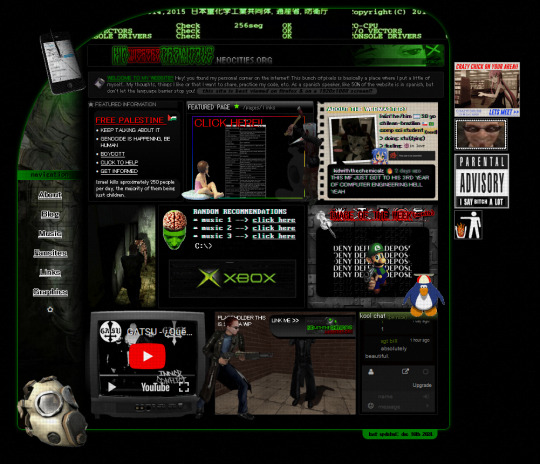

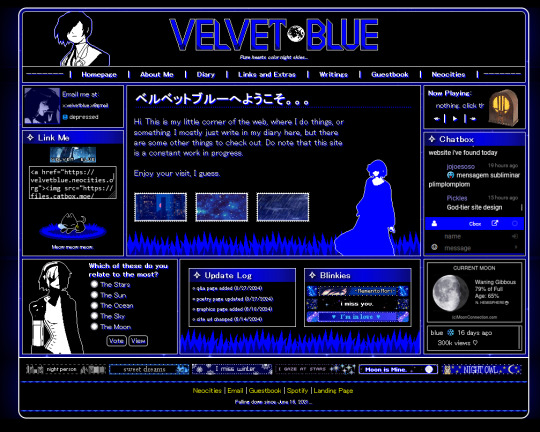

and then they get all excited because like, hell yea man look how much personality there is here! These are just 4 websites I pulled randomly. Each looks entirely different, each has it's own personality and navigation style and each is full of stuff to explore and check out.
Then they hear that all you need to do is learn HTML and as soon as they hear that it's over, I've lost them; they're GONE because they think "ok but I'm not smart enough to learn CODING" and it's like, dude chill.
I can't explain to people that big centralized web really do want to keep you stupid. You aren't stupid, you can learn HTML EASILY, I promise you if you sit down and pay attention to like a half hour video on coding; you'll be able to make a website. If you listen to a 4 hour video on coding you'll be able to make such a cool unique website you're genuinely happy with it.
But the big thing people don't get is that you don't NEED a fancy website or graphics or navigation or whatever. I'm part of a webring and I have 2 websites currently. One that I run personally, one that I run with a few other people. The thing about those is that they're both constantly under construction and almost never actually look like the examples you see above because myself and the others I work with are all still learning HTML.
I'm still in a webring, I still have people who actually use my button to link back to my website and vice versa. I have internet "neighbors" despite the fact my website is not at all impressive. Because the internet isn't for content it's creation for the love of creation.
I get people all the time who tell me they LOVE Hypnospace Outlaw and "wish the internet was really like that" to which I say, "oh you mean indie websites hosted by a webmaster rather than a company with everyone having a unique aesthetic and they're all connected via webrings and categories of their interests?" To which people go "yea that's not real" and I'm sitting here like:


^ They're the same picture.

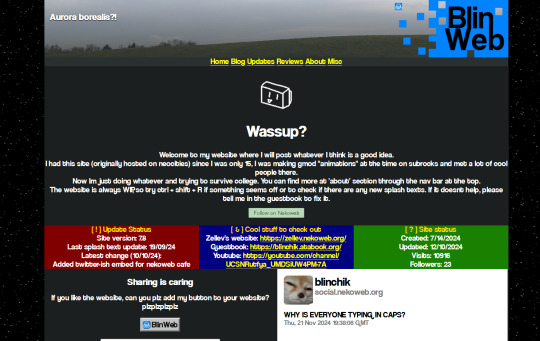


I mean okay hell come on THIS is part of a website I found:

The indie web is so incredible to me, and it doesn't end with just exploring various websites. I've found forums, I've found webrings for video games or apps; I've found CSS scripts to turn my discord into THIS without needing nitro:
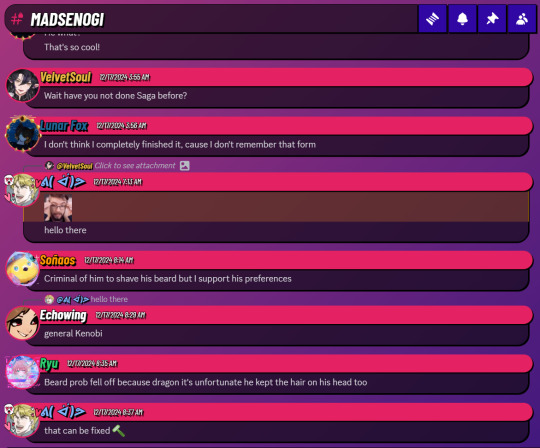
Which I fully admit is a matter of preference; but I enjoy it having more personality without having to pay monthly or whatever for discord of all things. All because I happened to stumble across a website that was part of a webring that lead to another website where I checked the personal projects of the individual and found this old CSS script they were working on; and thought it was cool.
The internet isn't just boring social media that we have to refresh every 5 minutes to get more funny memes; it's a communal place where anyone and everyone can create whatever they want and share it with the world. It's unfortunately very hard for me to explain to people that the Web Revival Movement isn't some like, hardcore manifesto down with the corporations communism thing. It's literally a set of values that a LOT of people on the indie web have. It's not even really a "movement" in the traditional sense. I've seen a lot of youth who get involved quickly lose steam with it, because they're expecting something that it's just, not.
There's a post on a forum from a user that basically said they didn't care for the Web Revival Movement and what's interesting is their reason why:

This user is still a minor and it's very likely they grew up with social media and "communities" when the Web Revival Movement IS actually just a method. It's a mindset, it's a ideal that a lot of people have and that we tend to follow; it is NOT a community, it is NOT a group of people fighting some fight against social media or whatever.
Another user talking about the web revival "community" likely doesn't help this feeling any, seeing as how some DO view it as a community; but pay attention to what they're saying here:

"The community of Web Revivalists" Alright, let's see if we can find them!

Huh... wait hold on let me just try searching in general for websites being created by people...
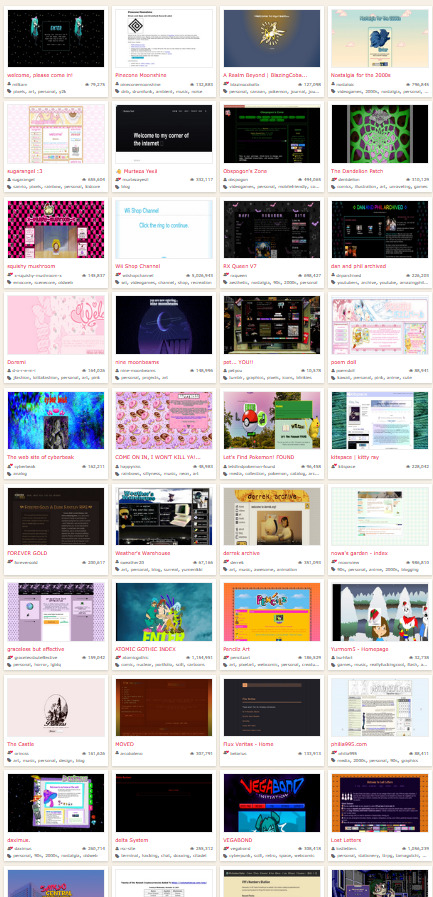
Huh okay there's a lot, but none of these websites are specifically talking about a "Web Revival Movement" none of them are out here preaching about some community or anti-capitalist ideals or how they hate social media. They're just, websites. So then how are they part of the Web Revival Movement exactly?!
Well the thing about the Web Revival is that it's about reclaiming tech and figuring out what it is we want from the tech/tools in our lives.
To put it really simply:

What this is saying is that all those websites are technically part of the "Web Revivalist Community" because they simply put, are online spaced that express the ideals by just... being created.
It's not that this is some community in the sense that You and I belong to The Movement. It's a community in the same way I live in a community, because I live on the same street as my neighbors. It's a community in the same way you could call a group of people who all play an MMORPG a "community" or a fandom a "community" or whatever.
You don't NEED to take any specific action, we're not fighting to make the web a better place through some kind of radical action, we view simply existing in a world that is so centralized; a radical action.
Which is why you have these young activists coming in going "okay I need to abandon everything that isn't anti-capitalist, anti social media, and anti-web3 I need to be an activist, I need everyone to know that I'm creating TO REBEL, I need to make the web a better place, I need to do this I need to do that even though I don't find it fun! Hey guys the internet isn't really fun :("
Personally I do my best to spread the word about webhosts like Neocities, Nekoweb, Teacake, Leprd.space, tiiny.host, ichi.city, tilde.town, and DigitalOcean for more advanced webhosting.
I genuinely feel like people would enjoy the indie web if they knew where to look for it, or knew how to explore it better. I mean look at the way people talk about it in comparison to social media:



That being said allow me to try to lend a hand to anyone and everyone who may have read this and thought "well I'd love to start exploring websites but I don't know how!" It's easy I promise, just follow these easy steps:
Find whatever hosting website you want to start with; for me it's gonna be Neocities because I am most familiar with it, just find the first website that looks interesting or do what I'm going to do for this example and click random and then click the first website it recommends. In this case we're looking at this:
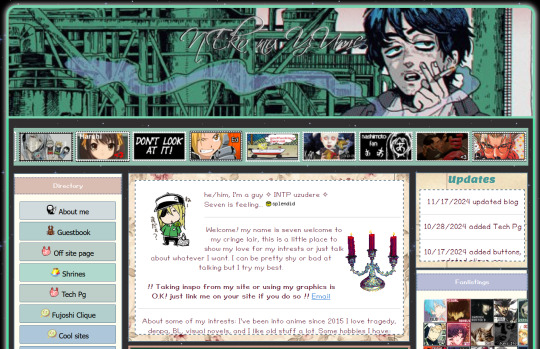
Alright it seems we've landed on a yaoi enthusiast website, hey why not. Now here's the thing, you can freely explore this website as you see fit, check out the about, sign the guest book (that's where you can leave a little comment saying whatever, they're fun.) Look through some shrines, explore the site; because someone put effort and work into this, but you're looking as well for a part of the website with some kind of link to a webring or another website.
In this case if we scroll right past the yaoi paddle and look at the bottom middle of the site we see this:

So these little buttons are essentially personalized links to websites. They're fairly common to have, in fact you can see the webmaster of this site offers their button if you want to link back to them. This isn't something exclusively for mutuals. If I like your website a lot and want to link to it, I use that button there to embed your button on my site and now whenever I access my homepage I have a direct, fast, and fancy link to your website just kinda... there. However for our purposes today we're just exploring the web, so any of these site buttons will do. If none of these interest you, use them as a sort of in between to get to the next; typically though if you're looking at sites that you actually have an interest in, you'll be able to find corresponding websites that are also on the topic of that kind of thing. The best part about this is that it typically leads to a webring which contains a bunch of websites all featuring the same sort of aesthetic, interest; or thing. You can even become a member of that webring.
That's it. It's a 2 step process you repeat for however long you want.
You'll often see people using either imood:
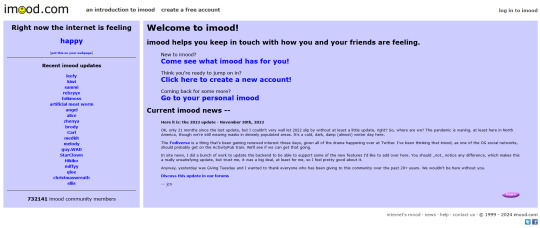
Or Status.cafe:
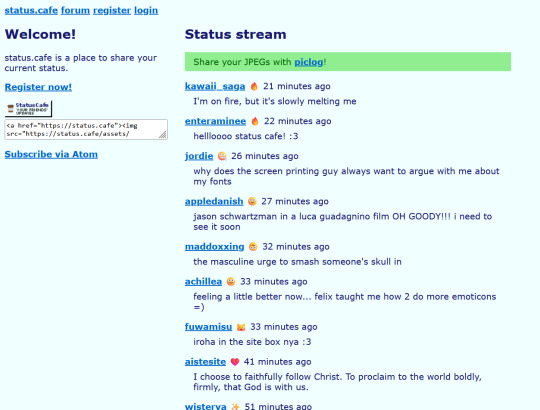
to have some kind of "this user is feeling this kind of way" thing. This is another big thing on the indie web. We tend to embed a lot of off-site features onto our sites. So get familiar with what other people use. You can easily find these sorts of things by just clicking around. For example that bit above in the first image that says "Seven is feeling... Splendid" if clicked, will take you to imood.
Remember, these sites use HTML, and your site uses HTML, and HTML can literally be viewed, edited, copied, etc. By just using inspect element on something and then looking through all the source code.
It's that thing that looks like this:

You can literally try this right now here on tumblr if you're curious about it. But I say this because it means that while you're out exploring the web, anything you see that you like; you can just kinda... copy the source code for. Why not? You're not hurting anyone! I promise. Learn from other webmasters like this.
The big thing about the indie web is that you get out what you put in. A site like Tumblr or Twitter or Facebook makes it very easy to make an account, but that's all you get; an account. You can't really customize it much, you can't really make it your own. You get out what you put in, you can't really put a lot of effort into it, and you'll not really get a lot out of it either. The indie web gives you literally a blank page and says "hey, code whatever you want in here!" So you can really just... code whatever you want into your website.
I'm more than happy to help explain HTML to people or help provide links to YouTube videos that sort of go over the very basics. If anyone is actually interested in getting their own website I'm happy to help however I can.
3 notes
·
View notes
Text
#Web Hosting Service#Google Cloud web hosting#Cheap SSL certificates#Best Cheap Web Hosting in India#best cheap web hosting providers in India#Best cPanel Hosting#best cPanel web hosting#Best Web Hosting Service Provider#cheap cPanel web hosting provider#Cheapest Web Hosting India#Cloud Hosting#cPanel hosting
2 notes
·
View notes
Text
The CMO’s Guide to CX in 2024: Navigate Turbulence and Drive Growth - Pulp Strategy

Explore the CMO's Guide to CX in 2024, navigating economic turbulence for brand growth and customer loyalty. Uncover key trends, strategies, and the imperative shift towards customer-centricity for success in the evolving marketing landscape.
0 notes
Text

Onix started with a high-level overview of the concept and all of the parts that come together to power your cloud-native apps. When we took that first dive into the world of Kubernetes 101, we learned that K8s works like a powerful locomotive engine that controls and drives the rest of the application train. This train is made up of compute nodes, clusters, containers, pods and more.
#google cloud platform#google workspace#google cloud web hosting#cloud hosting providers#google cloud services#google cloud solutions#google document ai#digital workplace#cloud collaboration service
0 notes
Text
2 notes
·
View notes
Text
Unlocking Potential Through Immersive VR-Based Training Solutions
Atcuality is dedicated to unlocking human potential through VR-based training solutions that push the boundaries of traditional learning methods. In industries where hands-on experience is crucial, VR allows trainees to engage in realistic scenarios without leaving the training room. Our VR-based training solutions are designed to provide the kind of experiential learning that helps individuals not just understand but deeply internalize crucial skills. From medical procedures to machinery operation, these immersive training environments offer flexibility and safety, removing the limitations of traditional learning setups. By simulating high-risk or complex tasks, learners can gain valuable experience while mitigating actual risks. With Atcuality’s VR training, companies can ensure their workforce is prepared for real-world challenges, resulting in enhanced safety, improved skill levels, and reduced onboarding and training costs. Our commitment to advancing training standards is evident in our ability to offer highly customizable, impactful VR experiences across various industries.
#digital marketing#seo optimization#seo company#seo changbin#seo services#seo agency#seo marketing#emailmarketing#search engine optimization#google ads#socialmediamarketing#ai services#iot#iotsolutions#iot applications#iot development services#iot platform#digitaltransformation#techinnovation#cloud hosting in saudi arabia#cloud server in saudi arabia#cloud computing#amazon web services#amazon services#mobile app development company#mobile app developers#mobile application development#app developers#app development company#azure cloud services
0 notes
Text

Transform Your Hosting or Tech Business with Meghgen Hosting Provider WordPress Theme 🌐🚀
Would you like to set up your hosting, tech, or IT business? Meghgen is the ultimate WordPress theme for web hosting providers, cloud services, and tech companies. Whether you're managing clients or showcasing your latest tech products, Meghgen has got you covered. Let's dive into why it's the perfect fit for your website!
🚀 Why Choose Meghgen for Your Hosting Website?
1. Seamless WHMCS Integration Managing clients, billing, and support just got easier. Meghgen comes with built-in WHMCS integration, perfect for hosting businesses. Automate everything from billing to customer support and free up time for what matters most—growing your business! 🙌
2. SEO-Optimized for Better Rankings Want more traffic? Who doesn’t! With SEO-friendly design, Meghgen helps boost your search engine rankings and attracts organic traffic. More visibility = more customers. 😎
3. Fully Responsive In today’s mobile-first world, you need a site that looks great on any device. Meghgen’s responsive design ensures your website will look stunning on desktops, tablets, and phones. 📱💻
4. Tons of Customization Options Get creative with unlimited color versions, Google Fonts, and an easy-to-use theme options panel. Customizing your site to match your brand identity has never been easier! 🎨✨
5. Speed & Performance No one likes a slow website. Meghgen is built for fast loading speeds and optimized performance. Say goodbye to high bounce rates and hello to happier visitors! 🏃♂️⚡
6. Lifetime Updates & Premium Support We’ve got your back! With lifetime updates and free support, your site will always stay up-to-date with the latest WordPress versions. 👨💻💡
💻 Perfect for Tech and IT Businesses
Tech companies need a website that matches their innovative solutions. Meghgen helps you create a professional, modern design with features like pixel-perfect design and advanced customization options. Whether you're showing off products or writing blog posts, Meghgen makes your content shine. ✨
🛠 Why Hosting Providers Love Meghgen
Client Management: Integrating WHMCS means automating billing, client management, and support all in one place. Simplify your processes and focus on what you do best.
Professional Appearance: Meghgen helps you create a sleek, modern website that looks amazing and works flawlessly.
Fast & SEO-Friendly: Optimized for speed and search engines, Meghgen ensures your site loads fast and ranks high on Google.
🌍 Who Should Use Meghgen?
Web Hosting Providers: If you offer domain hosting or cloud services, Meghgen is your go-to theme for a streamlined website.
Tech Companies: Showcase your IT services, software, or digital products with a design that speaks to innovation.
Freelancers & Agencies: Build amazing websites for clients in the hosting or tech industry without breaking a sweat.
Cloud Hosting Providers: Make your cloud hosting services stand out with a professional and responsive design.
📈 Final Thoughts
Meghgen Hosting Provider WordPress Theme is the ultimate choice for anyone in the hosting or tech industry. With its seamless WHMCS integration, SEO-friendly features, and fully responsive design, it’s the perfect tool to create a high-performance website. Whether you’re a hosting provider, a tech startup, or a cloud services company, Meghgen helps you build a site that’s professional, fast, and optimized for success. 💻🌟
Ready to get started? Try Meghgen today and see how easy it is to transform your online presence! 🙌💥
#WebHosting#WordPressTheme#TechWebsite#HostingProvider#SEOOptimization#ResponsiveDesign#CloudHosting#WHMCSIntegration#ITBusiness#WebDesign#TechSolutions#WebDevelopment#HostingBusiness#TechStartup#WebsiteCustomization#FastWebsites#TechTheme#HostingThemes#WebsiteOptimization#WebsitePerformance#PremiumThemes#WebDesigners#TechCompanyWebsite#WHMCS#SEOWebDesign
3 notes
·
View notes